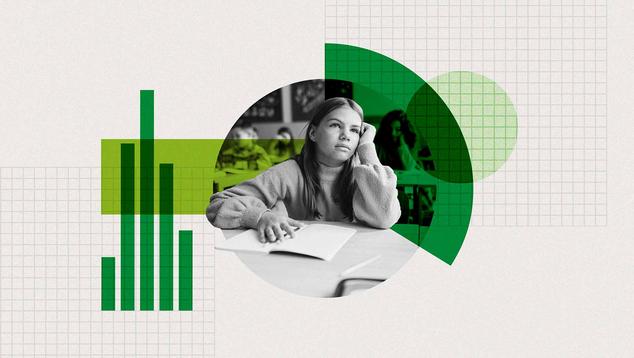Story Highlights
- Over a third of middle and high school students report feeling bored during class
- Students feel they have no control over their learning experiences
- Autonomy and ownership in learning drive high school students' preparedness
WASHINGTON, D.C. — Students are bored in class. This disengagement can significantly affect student motivation, behavior and achievement.1 To better understand student engagement in learning, the Opportunity Education Foundation and Gallup surveyed middle school (grades five through eight) and high school (grades nine through 12) students in Iowa.
These findings reveal the extent of low engagement in learning. Three key insights emerged:
1. Students Report Boredom and Lack of Enjoyment in Class
Nearly half of students in grades five through 12 (49%) strongly agree that they always pay attention in class, but only 10% strongly agree that they enjoy their classes. Boredom may be the problem: About a third of students (34%) agree or strongly agree that they always feel bored in class. These issues are bigger problems for older students — high school students report lower levels of engagement than their middle school peers, a pattern that aligns with long-standing Gallup trends and recent reports from a Walton Family Foundation/Gallup study.
Rethinking approaches to classroom instruction and content may aid educators in their effort to bridge the gap between student attention and enjoyment. Educators who implement differentiated learning — a teaching approach characterized by revising lesson plans to reflect student differences in learning preferences, readiness and interests — are likely to foster student engagement.2
A practical application of differentiated learning is increasing personalized learning content, an evidence-based method to combat boredom.3 By connecting lessons to student interests and building upon their current knowledge, educators can prioritize helping students make meaningful connections to their schoolwork.4 In doing so, students can concentrate on developing new skills that will prepare them for the real world, further promoting engagement.5
2. Students Do Not Feel in Control of Their Own Learning
Student agency — the ability to make choices about one’s learning and take an active role in shaping educational experiences — is a critical component of engagement in learning. Yet, many students feel like they have no control over their learning. Fewer than half of Iowa middle school students (48%) feel they are able to learn at their own speed; this drops to just 35% among high school students.
Lack of control, or autonomy, can lead to changes in student behavior and motivation for learning.6 The percentage of students who say they always pay attention in class is 52% for middle school students and 44% for high school students. When students are inattentive, they are less likely to participate. The rate of student participation in in-class activities is 81% in middle school and just 70% in high school.
It is important for educators to foster a sense of agency in the classroom. Providing students with choices is one effective way to support agency and ultimately improve academic achievement (see footnote 5).
3. Ownership in Learning Drives Post-Graduation Preparedness
Although many high school students (44%) report feeling prepared for life after graduation, just 11% feel very prepared. Two factors promote post-graduation preparedness:
- Students who take ownership in learning new skills in school that will help later in life are 53% more likely to feel prepared.
- Students who take ownership in learning new skills outside of school that will help later in life are 33% more likely to feel prepared.
The link between learning new skills (both inside and outside of school) and post-graduation preparedness emphasizes the importance of encouraging unique learning opportunities. Career-focused learning may offer one way to improve preparedness. A recent New Hampshire Learning Initiative/Gallup study found that students would like more career-focused learning opportunities. Incorporating financial literacy lessons, problem-solving opportunities, interpersonal skills, internships and mentorship resources can help students feel better prepared for life beyond high school.
Bottom Line
Through differentiated learning, giving students choices in their learning and encouraging student ownership in learning, schools can cultivate student engagement while also helping students build the skills and confidence they need for success.
Read the Learning in Focus: Examining Iowa Students' Engagement in Grades Five Through 12 report.
To stay up to date with the latest Gallup News insights and updates, follow us on X @Gallup.





